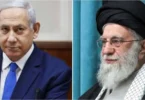At least seven people have been killed after a hospital and market were bombed in South Sudan, a medical charity has said, as fears grow of a return to civil war.
Doctors Without Borders (MSF) said helicopter gunships dropped a bomb on the pharmacy of the hospital it runs in Old Fangak, Jonglei state, burning it down, before firing on the town for 30 minutes. A drone then bombed a local market, MSF said.
The hospital is the only one in Fangak county, which has a population of more than 110,000 people, MSF said, and all its medical supplies were destroyed.
The charity called the attack, which left 20 people injured, a “clear violation of international humanitarian law”.
In recent weeks, Nicholas Haysom, who leads the UN mission in South Sudan, has warned the country is “teetering on the brink of a return to full-scale civil war”.
Those worries have been stoked by an escalating feud between President Salva Kiir and Vice-President Riek Machar.
Hours before the bombing, the head of the army, Paul Majok Nang, promised punitive strikes after several barges on a river were hijacked.
He blamed those attacks on a militia linked to Vice-President Machar, who has not commented on the claim.
Machar was arrested in March along with several of his associates, and accused of trying to stir up a rebellion.
The government has recently listed counties it considers to be hostile – in other words allied to Machar.
That increased the suspicion that South Sudan could be headed for another conflict involving the country’s two largest ethnic groups.
South Sudan gained independence from Sudan in 2011 but two years later, a civil war erupted when President Kiir dismissed Machar as vice-president, accusing him of plotting a coup.
The ensuing conflict, largely fought along ethnic lines between supporters of the two leaders, resulted in an estimated 400,000 deaths and 2.5 million people being forced from their homes – more than a fifth of the population.
A peace deal was reached in 2018 and a unity government forged with the same two men at the helm, but elections that were supposed to have been called since then have not happened.
The peace deal was also meant to see the end of all the militias and the formation of one united army – but that has not happened and many armed groups are still loyal to different politicians.
The current crisis was sparked earlier this year when the White Army militia, which was allied to Machar during the civil war, clashed with the army in Upper Nile state and overran a military base in Nasir.
Then, in March, UN helicopter attempting to evacuate troops came under fire, leaving several dead, including a high-ranking army general.
Rights groups have been calling for the military to stop bombing civilian areas.
Additional reporting by Yemisi Adegoke & Nichola Mandil







![Something is wrong somewhere – Pastor Enenche spits fire over Benue massacre [VIDEO] Something is wrong somewhere – Pastor Enenche spits fire over Benue massacre [VIDEO]](https://i0.wp.com/dailypost.ng/wp-content/uploads/2025/06/paul-enenche-.jpg?w=145&resize=145,100&ssl=1)
